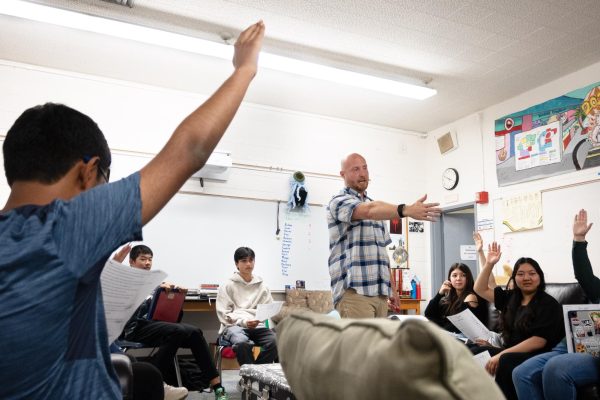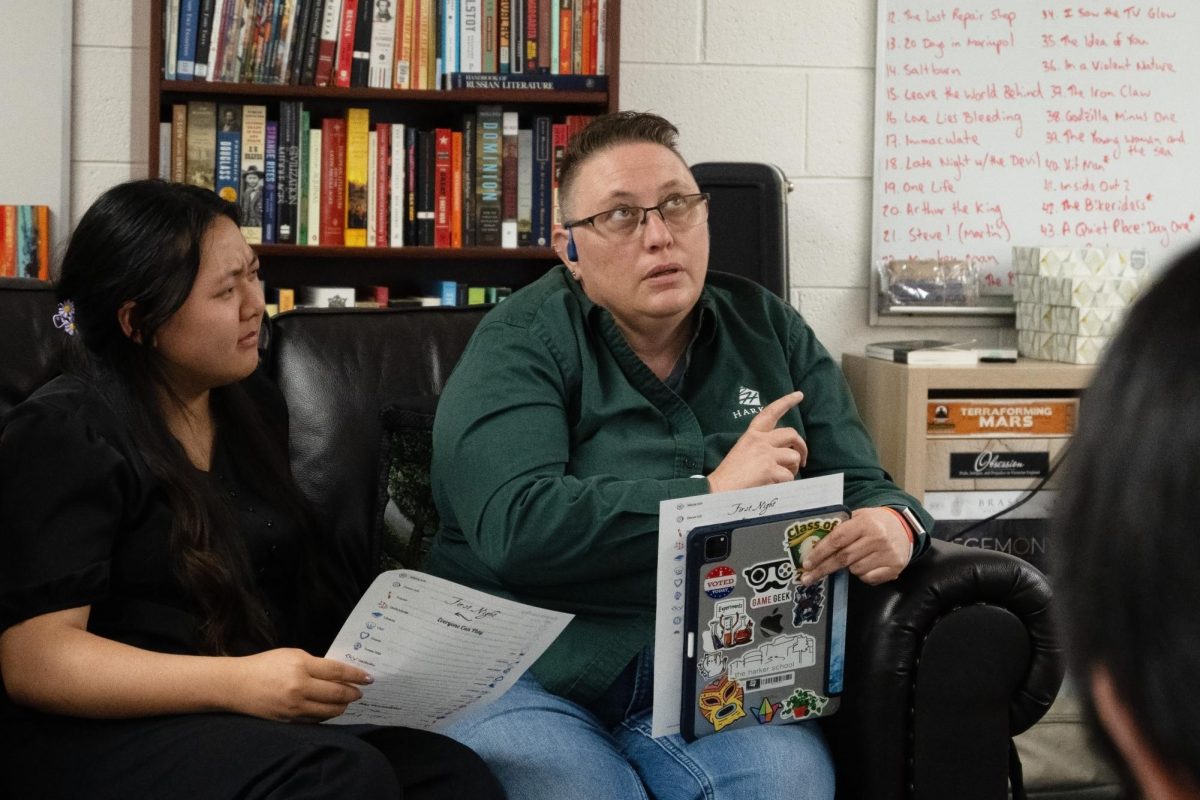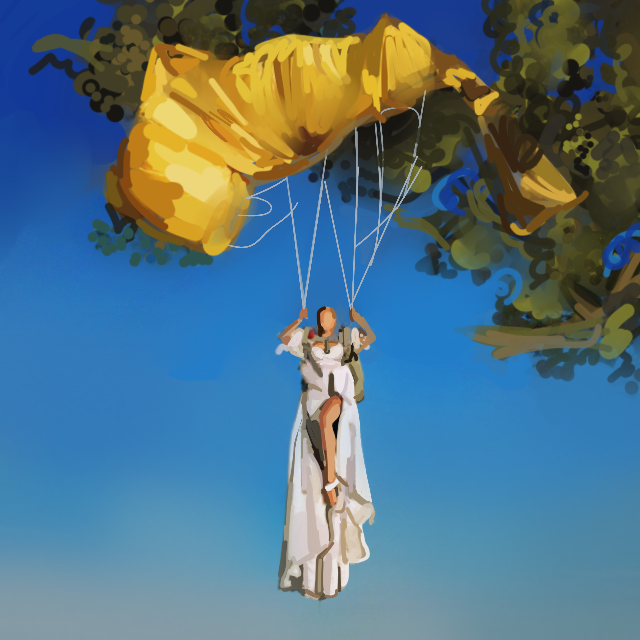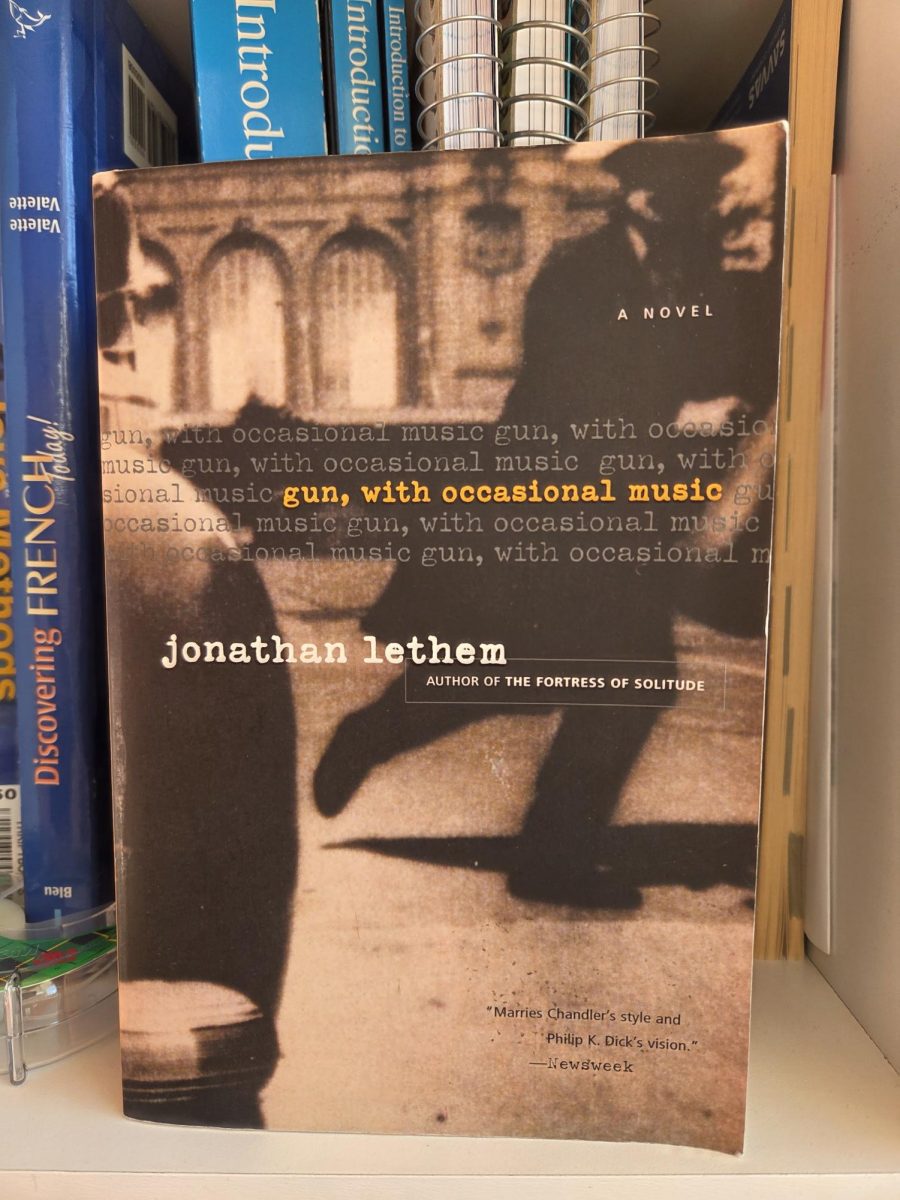A scream rips through the quiet town of Ravenswood Bluff. Sleeping civilians jolt awake to find the limp body of the local Storyteller, impaled on the roof of the clocktower. With the village’s safety on the line, it’s up to the remaining Townsfolk to convict the one Demon responsible for this untimely murder.
This is the mysterious premise of Blood on the Clocktower, a social deduction game where five to 20 players put their teamwork, deception and critical thinking to the test. A full session of the game takes anywhere from 90 minutes to two hours to complete.
Class of 2025 Dean Christopher Hurshman hosts sessions of Blood on the Clocktower every other Friday after school in Main Hall room 7. As Storyteller of the game, he is responsible for mediating the unique roles and mechanics of each player.
“I really like the fact that there’s individualized roles for each player and they each get to do something of their own,” Hurshman said. “Each game ends up feeling like a creation, something that you’re collaborating on.”
Participants begin by randomly drawing character roles belonging to two teams: the “good team” of Townsfolk and Outsiders, and the “evil team” of Minions and Demons. While most characters have information-gathering abilities, some can alter or nullify information available to the good team and decrease their chances of winning. Bluffing can also help evade suspicion.
“The goal of the Storyteller is to make the game entertaining and last long enough that all the players can have a good time trying to puzzle through it,” Hurshman said. “You have to maintain the interest for all the players without leaning one way or the other, which can be quite hard.”
Three official scripts, or unique combinations of playable characters, determine a game’s difficulty. “Trouble Brewing” is the novice script while “Bad Moon Rising” and “Sects and Violets” are intermediate scripts. Hurshman usually runs Trouble Brewing, in which the evil team must protect the Demon until only two players remain. Otherwise, the good team wins by killing the Demon.
The game’s progression is structured in “day” and “night” phases. Players close their eyes at nighttime unless the Storyteller wakes them to act on their abilities. During daytime, players hear about new deaths, discuss speculations and execute suspicious characters by majority vote. Unlike social deduction games like Mafia that disqualify dead players, Blood on the Clocktower’s dead players remain just as involved in discussions.

During Sept. 20’s game, first-time player Ainslie Chen (12) took on the role of Baron, a Minion who changes the number of Outsider characters present in the game. After being confirmed evil and executed with the help of good dead players, she acknowledged the importance of communication in Blood on the Clocktower.
“When you have more people, you can really get one-on-one conversations and team up with others,” Ainslie said. “Everybody can see what you’re doing and make judgments based on not only the information you’re sharing, but also social cues like your body language and who you talk to.”
Hurshman found the game on review site BoardGameGeek. After testing it with his 2024 Game Design course and the Class of 2025’s Senior Retreat, he decided to instate it as a regular activity for the school year. Now, students gather to play weekly or biweekly, including senior Claire Perng. In Sept. 20’s game, she played as the Poisoner, a Minion who nullifies the ability of a chosen character each night.
“I’ve liked it pretty much from the beginning, which is why I’ve continued to come back,” Claire said. “The first night I was really confused, but as we’ve played, we’ve grown not only as individual players but also together.”
The next session of Blood on the Clocktower is scheduled to take place on Oct. 18 at 3:05 p.m. Hurshman plans to teach returning players how to Storytell as the game garners more interest. In future game nights, multiple smaller sessions of Blood on the Clocktower could be run simultaneously.
Additional reporting by Saahil Herrero (12).




![LALC Vice President of External Affairs Raeanne Li (11) explains the International Phonetic Alphabet to attendees. "We decided to have more fun topics this year instead of just talking about the same things every year so our older members can also [enjoy],” Raeanne said.](https://harkeraquila.com/wp-content/uploads/2025/10/DSC_4627-1200x795.jpg)


















![“[Building nerf blasters] became this outlet of creativity for me that hasn't been matched by anything else. The process [of] making a build complete to your desire is such a painstakingly difficult process, but I've had to learn from [the skills needed from] soldering to proper painting. There's so many different options for everything, if you think about it, it exists. The best part is [that] if it doesn't exist, you can build it yourself," Ishaan Parate said.](https://harkeraquila.com/wp-content/uploads/2022/08/DSC_8149-900x604.jpg)




![“When I came into high school, I was ready to be a follower. But DECA was a game changer for me. It helped me overcome my fear of public speaking, and it's played such a major role in who I've become today. To be able to successfully lead a chapter of 150 students, an officer team and be one of the upperclassmen I once really admired is something I'm [really] proud of,” Anvitha Tummala ('21) said.](https://harkeraquila.com/wp-content/uploads/2021/07/Screen-Shot-2021-07-25-at-9.50.05-AM-900x594.png)







![“I think getting up in the morning and having a sense of purpose [is exciting]. I think without a certain amount of drive, life is kind of obsolete and mundane, and I think having that every single day is what makes each day unique and kind of makes life exciting,” Neymika Jain (12) said.](https://harkeraquila.com/wp-content/uploads/2017/06/Screen-Shot-2017-06-03-at-4.54.16-PM.png)








![“My slogan is ‘slow feet, don’t eat, and I’m hungry.’ You need to run fast to get where you are–you aren't going to get those championships if you aren't fast,” Angel Cervantes (12) said. “I want to do well in school on my tests and in track and win championships for my team. I live by that, [and] I can do that anywhere: in the classroom or on the field.”](https://harkeraquila.com/wp-content/uploads/2018/06/DSC5146-900x601.jpg)
![“[Volleyball has] taught me how to fall correctly, and another thing it taught is that you don’t have to be the best at something to be good at it. If you just hit the ball in a smart way, then it still scores points and you’re good at it. You could be a background player and still make a much bigger impact on the team than you would think,” Anya Gert (’20) said.](https://harkeraquila.com/wp-content/uploads/2020/06/AnnaGert_JinTuan_HoHPhotoEdited-600x900.jpeg)

![“I'm not nearly there yet, but [my confidence has] definitely been getting better since I was pretty shy and timid coming into Harker my freshman year. I know that there's a lot of people that are really confident in what they do, and I really admire them. Everyone's so driven and that has really pushed me to kind of try to find my own place in high school and be more confident,” Alyssa Huang (’20) said.](https://harkeraquila.com/wp-content/uploads/2020/06/AlyssaHuang_EmilyChen_HoHPhoto-900x749.jpeg)










